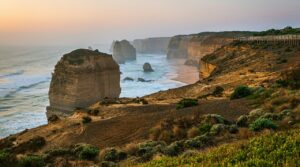
Top unique points about moving Down Under
Australia is a land full of surprises and unique features that make it stand out from the rest.
The country is known for its high standard of living, offering access to excellent healthcare, education, and infrastructure. Its major cities consistently rank well in global quality of life indexes. Its stable and prosperous economy with diverse industries, providing a range of job opportunities for skilled workers. It is safe and has low crime rates, providing a secure environment for residents.
If you wish to study or raise a family, you must know that the country has a robust education system, including reputable universities and educational institutions. It also has an efficient public healthcare system, Medicare, which provides access to essential medical services.
If you’re considering making Australia your new home, here’s what you can look forward to.
A World-Class Healthcare System
Australia’s healthcare system, Medicare, provides access to affordable, high-quality medical care. Permanent residents and citizens can access a wide range of services, from GP visits to hospital care, with costs significantly reduced or fully covered.
For migrants, this means peace of mind knowing that healthcare is not only reliable but also accessible. Many employers also provide private health insurance options, giving families even greater choice and flexibility.
Key takeaway: In Australia, good health doesn’t come at the cost of financial stability, it’s built into the system.
Education That Opens Doors
Australia’s education system consistently ranks among the best globally. With world-renowned universities, vocational institutions, and well-supported public and private schools, children and young adults are offered excellent opportunities to succeed.
Parents often find that moving to Australia means access to modern facilities, diverse extracurricular activities, and pathways into top universities both locally and internationally. For skilled migrants, vocational and higher education options also provide opportunities to upskill, requalify, or advance careers in line with Australian standards.
Key takeaway: Education in Australia is about more than academics, it’s about preparing for a successful and well-rounded future.
Career Growth and Opportunities
Australia’s economy continues to expand across multiple industries, including healthcare, engineering, IT, construction, and education. Skilled migration remains a priority for the government, meaning qualified professionals are in demand and often enjoy faster pathways to residency.
Flexible working conditions, a growing focus on diversity, and competitive salaries make the Australian workplace attractive. Regional areas also offer incentives for skilled workers, combining career opportunities with a more relaxed lifestyle.
Key takeaway: Skilled workers are valued in Australia and rewarded with genuine career mobility.
Work-Life Balance at Its Best
One of the most compelling reasons people choose Australia is its emphasis on balance. With strong workplace protections, standard leave entitlements, and a culture that values time outside of work, life in Australia isn’t just about building a career it’s about enjoying it.
Whether it’s weekend trips to the beach, exploring national parks, or attending cultural events in vibrant cities like Sydney and Melbourne, life outside of work is just as rewarding.
Key takeaway: In Australia, you don’t have to choose between career success and personal wellbeing, you can have both.
A Diverse and Inclusive Society
Australia is proudly multicultural, with more than a quarter of its population born overseas. New arrivals find it easier to integrate, thanks to communities that celebrate diversity and actively welcome migrants.
This cultural richness extends to food, festivals, and social life, giving families the chance to experience both global traditions and uniquely Australian values.
Key takeaway: Australia’s diversity ensures newcomers feel at home from day one.
Why Choose Australia for Your Future?
Healthcare, education, career opportunities, work-life balance, and cultural diversity, all of these elements come together to make Australia a destination where skilled professionals and their families can truly thrive.
Migrating may begin with a visa, but the bigger picture is about building a new life. For many, Australia offers not just a place to work, but a place to belong.
Explore the natural wonders of Australia
Flora and Fauna
 Australia is renowned for its distinctive and diverse wildlife. With its isolation from other continents for millions of years, Australia has evolved a unique ecosystem, hosting marsupials like kangaroos, koalas, and wallabies, as well as unique bird species such as emus and kookaburras. The Great Barrier Reef, a UNESCO World Heritage Site, is also home to an array of marine life, including colorful corals, fish, and sea turtles.
Australia is renowned for its distinctive and diverse wildlife. With its isolation from other continents for millions of years, Australia has evolved a unique ecosystem, hosting marsupials like kangaroos, koalas, and wallabies, as well as unique bird species such as emus and kookaburras. The Great Barrier Reef, a UNESCO World Heritage Site, is also home to an array of marine life, including colorful corals, fish, and sea turtles.
Explore the Outback!
The vast Australian Outback is a remote and rugged region that covers a significant portion of the country's interior. It's characterized by its arid deserts, stunning rock formations like Uluru (Ayers Rock), and unique landscapes such as the Pinnacles and the Bungle Bungles. The Outback is rich in Aboriginal culture, with ancient rock art sites and traditional indigenous communities.
Beaches
Australia boasts some of the most breathtaking beaches in the world. From the iconic Bondi Beach in Sydney to the pristine Whitehaven Beach in the Whitsundays, the golden sands, turquoise waters, and stunning coastal scenery are simply mesmerizing. Beach culture is deeply ingrained in Australian lifestyle, with surfing, swimming, and sunbathing being popular pastimes.
Landscapes
 Australia's landscapes are incredibly diverse, ranging from lush rainforests to vast deserts, from towering mountains to beautiful beaches. The country is home to stunning natural landmarks such as the Great Ocean Road with the Twelve Apostles, the Blue Mountains, Kakadu National Park, and the breathtaking Kimberley region, offering a remarkable variety of outdoor adventures and awe-inspiring scenery.
Australia's landscapes are incredibly diverse, ranging from lush rainforests to vast deserts, from towering mountains to beautiful beaches. The country is home to stunning natural landmarks such as the Great Ocean Road with the Twelve Apostles, the Blue Mountains, Kakadu National Park, and the breathtaking Kimberley region, offering a remarkable variety of outdoor adventures and awe-inspiring scenery.
Extreme Landmarks
Australia is home to some of the most extreme and unique landmarks on the planet. From the vastness of the Nullarbor Plain, the world's longest straight road, to the awe-inspiring horizontal waterfalls in the Kimberley, and the tallest mountain, Mount Kosciuszko, Australia has a reputation for having "big" and "extreme" features that are sure to leave visitors in awe.
A friendly, outdoorsie bunch!
A love of sports
Aussies are known for their love of sports, and it's an integral part of the national culture. Australian Rules Football (AFL), cricket, rugby, and surfing are just a few of the popular sports that Aussies are passionate about. The country has a proud sporting heritage, and many Australians actively participate in sports and outdoor activities.
Indigenous Culture
The Indigenous people of Australia, known as Aboriginal and Torres Strait Islander peoples, have a rich history and cultural heritage that dates back tens of thousands of years. Their unique customs, languages, art, and spiritual beliefs have shaped the country's identity, and their resilience and connection to the land are truly remarkable.
Multiculturalism
 Australia is a melting pot of cultures, with a rich diversity of people from all around the world. This multiculturalism is reflected in the country's cuisine, festivals, arts, and traditions, making Australia a vibrant and inclusive society, and giving families the chance to experience both global traditions and uniquely Australian values.
Australia is a melting pot of cultures, with a rich diversity of people from all around the world. This multiculturalism is reflected in the country's cuisine, festivals, arts, and traditions, making Australia a vibrant and inclusive society, and giving families the chance to experience both global traditions and uniquely Australian values.
So, whether you're exploring the Outback, cuddling a koala, catching a wave, or immersing yourself in Aboriginal culture, Australia's unique points are sure to leave you with unforgettable experiences and memories that will last a lifetime, mate!
Key takeaway: Australia’s diversity ensures newcomers feel at home from day one.
How does Australia, the country-continent, compare to other places in the world?
Australia is the world's sixth-largest country by total area, covering approximately 7.7 million square kilometers (2.97 million square miles). It is also the smallest continent, often referred to as "Oceania" or "Australasia." When considering Australia, many people also look at New Zealand as an alternative. For a detailed comparison between New Zealand and Australia, please visit this page.
Here's how Australia compares to other places in the world:
Australia is the largest country in Oceania and the sixth-largest country in the world, after Russia, Canada, China, the United States, and Brazil. It is larger than most countries in Europe and South America. But despite its large land area, Australia has a relatively small population compared to other countries. As of 2023, Australia's estimated population is around 25 million, which is relatively low compared to countries like China, India, the United States, and Brazil. Due to its large land area and small population, Australia has a low population density. The population is concentrated in major cities and coastal areas, while large parts of the interior, including the outback, are sparsely populated. This results in vast unpopulated areas with low population density, which is a unique characteristic of Australia.
More onf moving to Australia from
Canada | USA | United Kingdom | Europe | Singapore | Malaysia | South Africa
Australia is known for its unique and diverse wildlife. It is home to many endemic species, including marsupials like kangaroos, koalas, and wallabies, as well as unique birds, reptiles, and marine life. Australia's biodiversity is considered one of its major global assets and is recognised as one of the world's 17 "megadiverse" countries.
Australia's climate varies greatly due to its large size. It has a wide range of climatic zones, from tropical in the north to temperate in the south, and arid or semi-arid in the interior. The climate in Australia can be characterised by hot, dry summers and mild winters in many areas, with some regions experiencing extreme weather events such as bushfires, floods, and cyclones. The country has diverse and unique geographical features, including the Great Barrier Reef, the world's largest coral reef system, the vast Outback with its deserts and unique landscapes, ancient rock formations like Uluru (Ayers Rock), and stunning coastal areas with sandy beaches and rugged cliffs.
In summary, Australia is a vast and diverse country-continent, with a large land area, unique wildlife, diverse climate, and stunning geographical features. Its relatively small population and low population density are distinguishing characteristics that set it apart from many other countries in the world and make it a wonderful country to move to.
Not sure what visa is right for you?
Take our online eligibility assessment or get in touch with our team!


